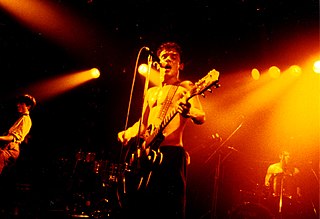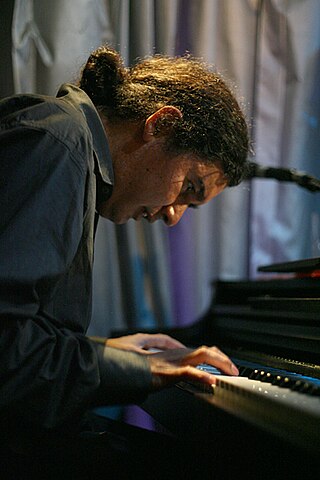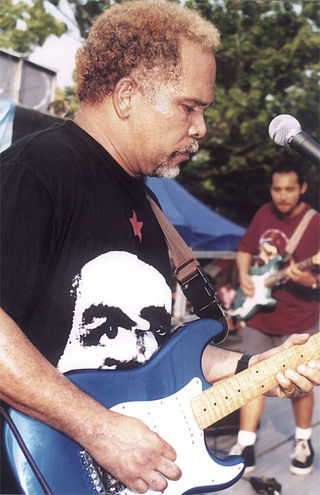Jazz is a music genre that originated in the African-American communities of New Orleans, Louisiana, in the late 19th and early 20th centuries, with its roots in blues and ragtime. Since the 1920s Jazz Age, it has been recognized as a major form of musical expression in traditional and popular music. Jazz is characterized by swing and blue notes, complex chords, call and response vocals, polyrhythms and improvisation. Jazz has roots in European harmony and African rhythmic rituals.

The music of Argentina includes a variety of traditional, classical and popular genres. One of the country's most significant cultural contributions is the tango, which originated in Buenos Aires and its surroundings during the end of the 19th century and underwent profound changes throughout the 20th century. Folk music was particularly popular during the 20th century, experiencing a "boom" in popularity during the 1950s and 1960s thanks to artists such as Atahualpa Yupanqui and Mercedes Sosa, prominent figures of the Nuevo cancionero movement. In the mid-to-late 1960s, the countercultural scene of Buenos Aires originated Argentine rock, considered the earliest incarnation of Spanish-language rock for having an autochthonous identity that differed from that of England or the United States. It was widely embraced by the youth and since then has become part of the country's musical identity as much as traditional music. According to the Harvard Dictionary of Music, Argentina also "has one of the richest art music traditions and perhaps the most active contemporary musical life.
Jazz standards are musical compositions that are an important part of the musical repertoire of jazz musicians, in that they are widely known, performed, and recorded by jazz musicians, and widely known by listeners. There is no definitive list of jazz standards, and the list of songs deemed to be standards changes over time. Songs included in major fake book publications and jazz reference works offer a rough guide to which songs are considered standards.

Arabic music is the music of the Arab world with all its diverse music styles and genres. Arabic countries have many rich and varied styles of music and also many linguistic dialects, with each country and region having their own traditional music.

Andean music is a group of styles of music from the Andes region in South America.
Bolero is a genre of song which originated in eastern Cuba in the late 19th century as part of the trova tradition. Unrelated to the older Spanish dance of the same name, bolero is characterized by sophisticated lyrics dealing with love. It has been called the "quintessential Latin American romantic song of the twentieth century".

Lambada is a dance from State of Pará, Brazil. The dance briefly became internationally popular in the 1980s, especially in the Philippines, Latin America and Caribbean countries. It has adopted aspects of dances such as forró, salsa, merengue, maxixe, carimbó and Bolivian saya.
Afro-Cuban jazz is the earliest form of Latin jazz. It mixes Afro-Cuban clave-based rhythms with jazz harmonies and techniques of improvisation. Afro-Cuban music has deep roots in African ritual and rhythm. The genre emerged in the early 1940s with the Cuban musicians Mario Bauzá and Frank Grillo "Machito" in the band Machito and his Afro-Cubans in New York City. In 1947, the collaborations of bebop trumpeter Dizzy Gillespie and percussionist Chano Pozo brought Afro-Cuban rhythms and instruments, such as the tumbadora and the bongo, into the East Coast jazz scene. Early combinations of jazz with Cuban music, such as "Manteca" and "Mangó Mangüé", were commonly referred to as "Cubop" for Cuban bebop.

Mano Negra was a French music group active from 1987 to 1994 and fronted by Manu Chao. The group was founded in Paris by Chao, his brother Antoine and their cousin Santiago, all born of Galician and Basque parents with partly Cuban roots. Their songs were mostly in Spanish, English and French, often switching from one language to the other in the same song or in the middle of a sentence or title. They also had a hit song in Arabic. They are considered pioneers of world fusion.
Al-Andalus Ensemble is a husband and wife musical duo that performed contemporary Andalusian music. The ensemble featured Tarik Banzi playing oud, ney and darbuka, and Julia Banzi on flamenco guitar.
Contradanza is the Spanish and Spanish-American version of the contradanse, which was an internationally popular style of music and dance in the 18th century, derived from the English country dance and adopted at the court of France. Contradanza was brought to America and there took on folkloric forms that still exist in Bolivia, Mexico, Venezuela, Colombia, Peru, Panama and Ecuador.
Ethno jazz, also known as world jazz, is a subgenre of jazz and world music, developed internationally in the 1950s and '60s and broadly characterized by a combination of traditional jazz and non-Western musical elements. Though occasionally equaled to or considered the successor of world music, an independent meaning of ethno jazz emerged around 1990 through the commercial success of ethnic music via globalization, which especially observed a Western focus on Asian musical interpretations. The origin of ethno jazz has widely been credited to saxophonist John Coltrane.

Daniel Tinte is a pianist from Argentina.

Luis Díaz Portorreal, best known as Luis Días, was a musician, composer and performer of popular music born in the Dominican Republic.

Xavier Moyano is an Argentine musician; producer, performer, composer, and educator. He began his career as a session guitarist in Tucuman in 1999. By 2003 was the guitarist for rock/pop band "AVe Cesar" until 2008, after that he became a solo rock instrumentalist. Between 2009 and 2011 he was guitarist and composer of metal band "Seliger" (Argentina/Brasil), between 2014 and 2019 he was guitarist and producer of "Cossas Novas", since 2018 he is guitarist and co-producer of "Rock Bro's" (ClassicRock). He is currently a solo guitarist, session musician and producer.

Yehuda Julio Glantz is a musician, composer, singer, songwriter and producer living in Jerusalem Israel. Named and recognized as Cultural Ambassador of Latin Hebrew Music from Israel to the world. Glantz is a multi-instrumentalist playing on the Charango, piano, accordion, siku, pincuyo, guitar, flute, cuatro and is also a percussionist. Yehuda has twice received the first place award in the klezmer Safed festival for his performance and compositions. In 2008, Yehuda founded the Regalim Festival in the City Center of Jerusalem. The festival takes place during both Sukkoth and Passover holidays and attracts thousands of visitors from around the world.

The following outline is provided as an overview of and topical guide to jazz:
Fusion Jonda is a Puerto Rican band that blends Caribbean music with gypsy-flamenco sounds, melodies, and rhythms. The band has centered its music around Afrobeat, jazz, Arabic, and Indian music and has a contemporary approach.












